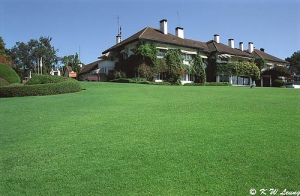There is a lot of death and suffering here. People die openly and everyone is more connected to the circumstances of a human life – fluids, dead bodies and sickness. In the west we lead lives of isolation that keep the symptoms of poverty removed from our daily lives. And so it is not hard to conclude that most people in the west have little empathy for poverty. We just don’t see it.
The same is true of the natural world. We like nature when we can see it out our windows or have it in the landscapes of our life, but it must be managed and contained. No weeds, no bugs or snakes or bats. We want to keep them out.
Here, the natural world climbs into my shoes at night, rummages through my bags and my bed, lands in my tea and more than once I have crunched down on an insect in my food. Everything in the preparation of food is close and real – the slaughter and gutting of the animal, the draining of the blood. Now I am communing with the other part of the natural world that seems so pervasive here in northern Kenya. I am sick.
It must be the food that was served at Isgargaro camp in Loglogo. While it came on slowly as we drove to visit Malawan in Ndikir village, I seem to be the worst one off. We reach Nanyuki by nightfall and I spend the night vomiting, with diarrhea and chills. The toilet would not flush and the cockroaches climbed on my legs. By the morning I had blurred vision and a pounding headache.
And so I caved. With an alternative motive to inspect the newly renovated Mt. Kenya Safari Club, I check into the hermetic cocoon of the isolated tourist. I take a long bath, have room service deliver warm soup and a fire is lit in my cozy room. I sleep.
Over the next two days I spend a few hours in the Nanyuki office with Kura and Sarah but then rush back to my cocoon for more sleep and soup. Each drive that I make in the landcruiser from the town that is bogged in mud and garbage and crowds, to the slopes of Mt. Kenya where it is cool and quiet and staffed with people who try to anticipate my every need, brings me closer to the reality that I am a lousy humanitarian.
All I can do is bear witness to extreme poverty and work to bring resources that will change the circumstances of a few lives. My visit with Malawan in Ndikir, a woman we have profiled in a number of BOMA publications, brings me also to the crossroads of being a woman. Malawan has eight children and it was the savings from her REAP business that paid for the medical procedure she needed after the miscarriage of her 9th child. I love my encounters with Malawan because she does not give me simple platitudes of gratitude. She is passionate. I will never forget the first time I met her when she basically said to me, “Tell me that this program will work because I have eight children that I have to keep alive and right now I am having a hard time seeing how this program will do this.”
Malawan’s accomplishment’s, and that of her fellow business partners, is a joy shared by all of us at BOMA. I’m glad we could change the circumstances of Malawan’s life. I wish I had her strength, her fortitude, her will to survive despite a life that seems so hard to me. Because right now I feel just plain miserable and I want to go home.


